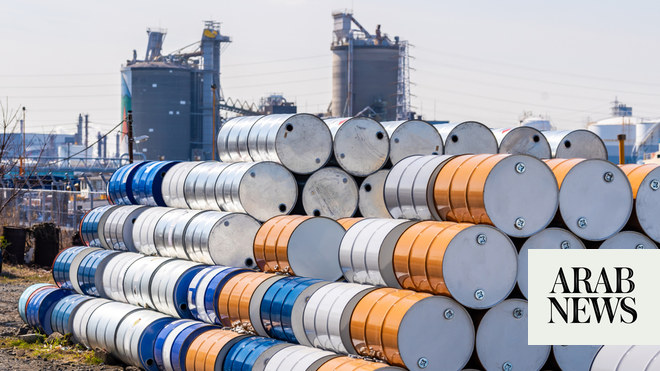
These are the weirdest of times. Oil prices, which during the last crisis hit $147 a barrel, have just turned negative. That’s right. Crude is so cheap they are giving it away.
So much for the idea of a top-level deal to put a floor under oil prices. Little more than a week ago, all the talk from Donald Trump was of how he had banged heads together and forced Russia and Saudi Arabia into production curbs that would bring global supplies of crude more into line with demand. On Monday night, the price of US benchmark crude was -$38 a barrel.
The reason for an unprecedented one-day collapse in the price is partly technical. Crude for June delivery is trading at more than $20 a barrel. That said, the chances of a binding deal always looked fanciful. The oil cartel Opec does not have the power it once wielded, even when the group is expanded to include Russia.
The west’s shutdown means oil demand has plummeted. There are supertankers out at sea full to the brim with crude at a time when storage facilities – especially in the US – are close to capacity. The number of active US rigs has fallen by 35% in the past month, because many are now uneconomic.
The cost of crude will eventually start to rise again, but not because of Trump’s browbeating, nor because of a Moscow-Riyadh deal, but because there is a more powerful force at work: the price mechanism.
Sunak’s startup support scheme responds to a real threat
Rishi Sunak’s decision to support innovative startup companies is the latest example of political cross-dressing by the government. First it was higher public spending, then it was stepping in to subsidise jobs. Now it is the ultimate throwback to the 1970s: picking winners.
Under the chancellor’s new scheme, the government will provide loans to companies in which private investors have already put money. If the loans can’t be repaid, the Treasury will pick up an equity stake at a knockdown price, providing a potential upside for the taxpayer if the company does – let’s say – come up with the latest big thing in artificial intelligence or a treatment for Covid-19.
The evidence from the flurry of Treasury action since the UK went into lockdown suggests it is wise to study the detail before making a judgment on a scheme’s merit. But notwithstanding the need to study the small print, Sunak’s decision to intervene is welcome.
For decades the idea that the government could second-guess the markets and identify companies with growth potential has been a term of political abuse in the UK, but what happened 40 or 50 years ago was not really about picking winners so much as bailing out losers.
The case for providing financial support for innovative firms is strong, not least because many of them are startups, and so don’t qualify for help under the other packages the chancellor has announced.
Even in the best of times, companies that tend to burn through cash quickly and are some distance away from making a profit can find life challenging. There are plenty of reasons for that: banks that are unwilling to lend; a much less developed venture capital industry than in the US; a longstanding difficulty in turning ideas into commercial products.
Sunak, with his background in the hedge fund industry, has taken personal interest in the package for innovative firms, and it is right that the chancellor is responding to the very real threat that the firms of the future will be decimated by the pandemic.
This is a high-risk sector and there will be companies that go bust, taking the state’s money with them. Sunak has sought to guard against that by insisting government money be matched by private investment. If there is a quibble, it is about the fact that he has initially only pledged £250m to the Future Fund, and that may not be enough.












